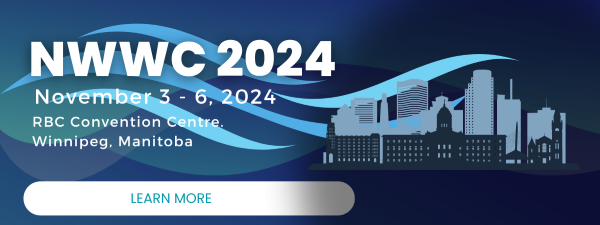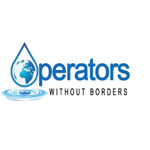 |
||||||||||||||||
| Subscribe | Past Issues | www.cwwa.ca | Water Source Magazine | ||||||||||||||||
|
CWWA News
“Never let a good disaster go to waste!” We say this a lot in our industry and it is a very wise saying. Of course, if it is ‘your’ disaster happening to ‘you’, you can’t help but learn from the experience…why did it happen? could it have been prevented? can we prevent it from happening again? But does the disaster have to happen to you in order to learn from it? Registration now open! The Conference program for the NWWC 2024 is almost ready, and it looks in fantastic. In the meantime we're excited to launch Conference registration. Don't forget we've also got sponsorship and exhibitor opportunities available for our private sector partners who want more exposure! Federal Initiatives
Bill C-59, which included the Canada Water Agency Act, received Royal Assent last week. This is a significant milestone in towards establishing the Canada Water Agency (CWA) as a standalone entity (outside of Environment and Climate Change Canada but reporting to the Minister of Environment). Royal assent is the formal approval of a bill by the Governor General, on behalf of the Sovereign. It is the final step in the legislative process for a bill to become law. The Wastewater System Effluents Regulations amemdments came in to force on May 27. These amendments will allow eligible owners and operators of wastewater systems (regulatees) another opportunity to receive transitional authorization to upgrade their system. It also expands temporary bypass authorizations to apply to all planned releases in the wastewater infrastructure, at treatment plants and within the collection system, and [applies] a risk-based approach to the planning, evaluating and authorization of these releases. CWWA submitted comments and circulated the proposed changes to our membership during the proposal phase of the regulations. At the G7 Ministers' Meeting in Turin, Italy in early May, Canada's Minister of Environment and Climate Change, Steven Guilbeault, collaborated with G7 nations on climate, environment, and biodiversity initiatives. The G7 committed to phasing out unabated coal power by the early 2030s and increasing energy storage to 1,500 GW by 2030. Canada led the push for phasing out inefficient fossil fuel subsidies, with a progress report due in 2025. Momentum was built for a legally binding global plastics treaty by year-end. The G7 launched initiatives including an Adaptation Accelerator Hub and a Water Coalition. Member News
Born from a recognition of the urgent need for skilled water treatment experience in crisis situations, OWB stands as a testament to the power of volunteerism and expertise in addressing critical environmental challenges. This vision has materialized into reality, with OWB now boasting As OWB continues to grow, its story of successfully working with operators in developing countries serves as an inspiration and a model for collaborative, skill-based environmental initiatives worldwide. Save the date! The 2024 Virtual Career Fair will be returning on September 18, 2024, starting at 8 AM MT. Whether you’re looking for a new candidate or a new job, our career fair is a great chance to expand your network and learn a thing or two during our lineup of webinars. There’s truly something for everyone, and we can’t wait to see you there!
Provincial News
CBC News Premier Doug Ford's government is scrapping Ontario's program for sampling wastewater to monitor the level of COVID-19 in the population. The program measures how much of the virus that causes COVID-19 is circulating around the province and is run by a dozen universities and research sites, through funding from the Ministry of the Environment, Conservation and Parks Snippings & Clippings
NPR Water utilities and chemical companies are challenging a recent rule from the Environmental Protection Agency that limits some PFAS, or “forever chemicals,” in drinking water. At least three lawsuits against the rule were filed in the U.S. Court of Appeals for the D.C. Circuit this month, ahead of a June 10 deadline for submitting such challenges. The Safe Water Drinking Act, requires parties challenging a regulation to file a petition within 45 days of its publication in the Federal Register. CTV News An outbreak of summer weather didn’t deter Calgary from turning off the taps Saturday. At her Sunday morning update, Calgary mayor Jyoti Gondek said the city’s water consumption Saturday came in at 451 million litres, well below its threshold level and the lowest total in the past three days. We could probably fill the entire Snippings and Clippings section with stories about the critical water main break in Calgary and the resulting water restrictions. We've selected a few articles as a sample of media coverage. You can also check the City of Calgary page directly for the latest updates. NJ Spotlight News Legislation the House passed Tuesday would require the Federal Trade Commission, an independent agency that regulates consumer affairs, to write and enforce new rules to require labels on packages of sanitary wipes that clog sewer systems nationwide. Cochrane CAO Mike Derricott outlined how the town worked with Alberta Environment to transfer the Girl Guides of Canada water licence from Camp Jubilee to the town. Water Canada With escalating global water concerns and the increasing urgency for effective water management, water utilities must accelerate their digital transformation efforts, says global research and advisory firm Info-Tech Research Group in a recently published industry resource. CTV News The city of Calgary is under a mandatory water advisory where officials are telling all residents and businesses to strictly limit their water usage following a major water main break on Wednesday. WRAL News Some of the largest utilities in the state are dealing with PFAS levels above the EPA's new standards including Piedmont Triad Regional Water Authority, City of Durham, City of Greensboro, Fayetteville Public Works Commission, and Brunswick County Public Utilities. C&EN In the US, nearly 100 million people are currently recommended medications like metoprolol and atenolol to help reduce their blood pressure. As an unintended consequence, some of those drugs are ending up in US waterways. New research confirms that increased levels of pharmaceuticals, recreational drugs, and their byproducts can be found in the Hudson and East Rivers in New York City after heavy rainfall events, and might be found elsewhere too (Environ. Toxicol. Chem. 2024, DOI: 10.1002/etc.5891). |
||||||||||||||||









